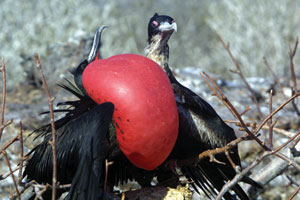Galápagos in Peril
According to International Galápagos Tour Operators Association (IGTOA) the iconic eco-paradise is in mortal danger.
Glossy travel brochures extolling the ecological splendour and natural marvels of the Galápagos Islands often obscure the underlying plight of these remote volcanic islands.
Long the domain of high profile nature and travel documentary makers in the Attenborough mould, the Galápagos Islands have, in truth, been the subject of great havoc at the hands of mankind.
But according to the non-profit International Galápagos Tour Operators Association (IGTOA) formed in 2003, the fight to preserve the Galápagos Islands is being lost. In a report issued earlier this year, The State of the Galápagos, IGTOA warns, “Slowly but surely, we’re losing the fight to preserve the Galápagos Islands. Yes, tourism is doing fine, and travellers are arriving in record numbers, but look a little deeper; the news is not good. At the peak of their popularity, the Galápagos are in trouble.”
The report states that even under the best of circumstances, protecting the Galápagos is an enormous task. Invasive species of plants and animals require millions of dollars for scientific studies and eradication programs. The surrounding marine reserve, which supports all terrestrial life, is under attack from overfishing.
“The Galápagos Islands belong to Ecuador, which has historically been supportive of conservation, but that has changed,” says Dave Blanton, Executive Director of IGTOA. “Without that support, the task of conservation is insurmountable.
The picture painted by IGTOA is deliberately gloomy. Clearly their aim is to galvanise public opinion toward the conservation and preservation of the islands, but how far off the mark are they? Not very!
The Galápagos Islands were never a hospitable place. Forged from the molten furnace of the Earth’s interior just a few million years ago, the delicate and fragile ecosystems there evolved almost by accident, probably from living flotsam, that washed up on its desolate shores. In the Galápagos, man is definitely a new and introduced species.
Consequently the life that is now part of this World Heritage Listed marine reserve is extremely fragile. The slightest interruption to the food chain or eco-system has an immediate knock-on effect and man’s continual meddling is having an on-going effect.
“When sailors first discovered the Galápagos in the mid-1500s, they weren’t so much in awe of the natural beauty, “ explains Stewart Campbell, CEO of Adventure Associates, “they were more taken by the apparent limitless supply of fresh meat thanks to the giant tortoises.”
Man’s influence extends to hunting, farming, fishing and the introduction of highly destructive feral species such as goats, dogs and rats.
“News reaching us of strife in the park management as well as unmonitored and illegal fishing is troubling,” continues Stewart, “ joining IGTOA was as much a pragmatic decision about preserving our business as it was protecting the Galápagos - which are the esssential aims of the Association.”
Adventure Associates were, back in the early’70s, the first travel operator to begin group tours from Australia to the Galápagos and are now the newest member of IGTOA.
UNESCO World Heritage in danger?
IGTOA reports a recent article in Science magazine states that long-line fishing kills 300,000 albatross each year. Nineteen of the 21 world species of albatross are in danger of extinction. In a recent letter to the director of the UNESCO World Heritage Centre, IGTOA requested an investigation that may ultimately place the Galápagos on the list of World Heritage Sites in danger.
In response to pleas from IGTOA, a delegation from the UNESCO World Heritage Centre, headed by its Director, Francesco Bandarín, arrived in the Galápagos Islands on 14 April for a three-day visit. The purpose was to meet with stakeholders and learn firsthand about issues. Bandarín stated, “We have received worrisome reports on the situation in Galápagos.”
Although the UNESCO delegation weren’t there to make pronouncements, their presence indicates an international eye is now firmly trained on this trouble spot and that issues of conservation and management will now be critically assessed by a higher level and in full view of the world.
IGTOA’s advice: If you travel to the Galapagos, the most important decision you make is the choice of a responsible travel company. By choosing an IGTOA member you will travel with a knowledgeable and responsible tour operator that supports sustainable ecotourism. IGTOA members are informed, involved, and concerned.


